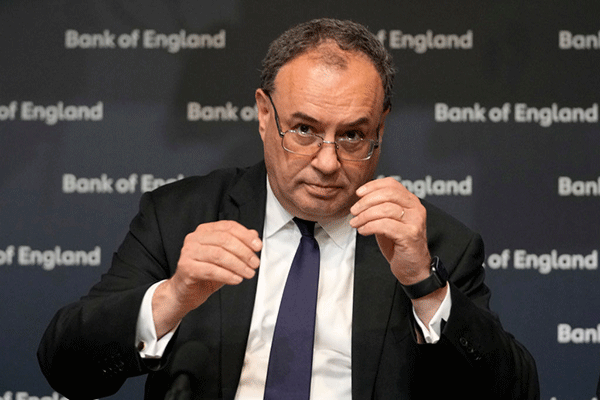10.1% inflation shock: what it means for your retirement
17th August 2022 11:54
by Alice Guy from interactive investor
As the inflation figure reaches double digits for the first time since 1982, Alice Guy examines when inflation might peak, what it means for investors, and whether it signals the end of early retirement for many.

Runaway inflation defied analysts and rose to an eye-popping 10.1%, according to figures out this morning from the Office of National Statistics (ONS).
The inflation nightmare continues as the anxiety-inducing figure reaches double digits for the first time since 1982. And ONS data also reveals that wages are lagging far behind inflation and fell by 3% in real terms in the last quarter. It’s a depressing figure, but probably comes as no surprise to most of us: many Britons are significantly poorer than this time last year.
RPI, which also includes housing costs, arguably a more relevant inflation figure for most of us, was even higher at 12.3%. If inflation continues at that level, according to ii writer Ian Cowie, inflation “will halve the purchasing power of money in less than six years”.
- Read about: Free regular investing | Opening a Stocks & Shares ISA | Cashback Offers
And the bad news seems to keep coming, as recent figures from Auxilione reveal that energy for an average household could reach £5,264 by April 2023.
Commenting, Myron Jobson, senior personal finance analyst at interactive investor, says: “There has been no respite from the relentless rise in prices, which has hit double figures sooner than when many expected. Inflation is running red hot and continues to wreak havoc on personal finances.
“Prices continue to rise at their fastest rate in 40 years, with the soaring cost of food – particularly bread, cereals, milk, cheese and eggs - fuelling inflation the most last month. The rising cost of energy and fuel are among the other biggest drivers of inflation. The impact of inflation is not felt equally by all consumers. Given the greater proportion of household income that poorer families dedicate to these areas of expenditure, it has affected them more.”
Walking the tightrope
It’s a difficult balancing act for the Bank of England as they walk the interest rates tightrope. Keep interest rates too low and we could be staring down the barrel of persistent high inflation. Raise them too high and they could trigger, or at least exacerbate, a painful recession.
In theory, raising interest rates stop consumers and businesses spending money, forcing prices to drop as demand reduces. The problem is that raising interest rates is a blunt tool and often affects consumers more quickly than larger businesses. The changes take time to filter through to the economy, possibly as long as 12 months.
- Shares to protect against persistently high inflation
- What an inflation shock really looks like
- Recessions are becoming more likely – here’s how to invest
Many experts expect the UK to enter a recession in the autumn, at roughly the same time as inflation hits its peak, triggering a possible period of stagflation: a time a high inflation, accompanied by economic stagnation.
So, is there any good news on the horizon? Well, one glimmer of hope is that most experts agree that inflation is unlikely continue for a long period. It’s hopefully a relatively short-lived spike: a reaction to the end of the Covid crisis and subsequent supply chain problems, made worse by the ongoing conflict in Ukraine.
When will inflation peak?
According to the Bank of England, high inflation will continue for some time. They expect energy prices to push inflation to 13% during the autumn, not falling back until next year. The Bank comments that, “it’s unlikely that energy and imported goods will continue to rise as rapidly as they have done recently. And we expect some of the production difficulties businesses are facing will ease”.
The Bank expects inflation to fall back towards the end of the year once the UK enters a recession. They comment that, “CPI inflation is expected to rise...to just over 13% in 2022 Q4, and to remain at very elevated levels throughout much of 2023, before falling to the 2% target two years ahead”.
But some experts don’t agree. According to Schroders, “the Bank expects inflation to eventually fall back after the country enters recession, but Schroders does not believe it will fall back as much as the Bank is forecasting”.

Caption: Andrew Bailey, governor of the Bank of England
What does it mean for investors?
For investors, those saving for retirement and those already drawing on their pension, it’s a worrying time. Some will struggle to find the spare cash to invest, while others will see the value of their portfolio eroded in real terms.
If you’re still regularly investing, then a period of stock market volatility can provide investing opportunities as the benefits of pound-cost-averaging kick in. You’ll be able to buy the market when it’s high, when it’s low and everything in between. You may not beat inflation in the short term, but your investments will hopefully start to pick up once the economy recovers.
Historically, stock market investment tends to beat inflation significantly in the long run. Dzmitry Lipski, head of funds research at interactive investor, comments that, “if you invested in UK Equities (FTSE All-Share) 20 years ago, your real return is 4.7% annualised (based on average inflation of 2.5%). Assuming you invested £3,000, then you got £12,143 in nominal terms and £7,201 in real terms, adjusted for inflation”.
- Five ways to maximise your pension income
- Dividend investing: three tips for a comfortable retirement income
The end of early retirement?
But, for those planning retirement in the short term, the latest inflation figures make grim reading.
Rebecca O’Connor, head of pensions and savings at interactive investor, says that, “the latest inflation numbers will heap more despair on people trying to plan a decent retirement. They will also dismay those who recently retired thinking that they would be OK, but now can’t make the numbers add up. Those who chose to retire early during the pandemic may now be regretting that decision.
“It looks like ‘back to work’ will be the order of the day for older people who would like to enjoy retirement but can’t because of rises in the cost of living.
- How to plan for a comfortable retirement
- Eight ways to help inflation-proof your retirement income
- FIRE movement exposed: is it really possible to retire at 40?
“We’ve already seen from ONS labour market figures earlier in the week that more people aged 65 or over are continuing to work, or returning to work since the pandemic. Higher inflation could drive this trend and put retirement on pause for hundreds of thousands of would-be retirees, or bring more of those who had perhaps prematurely thought they were in a good position to leave work back out of retirement.
“That’s for those who can still work. There is a good reason that retirement is a thing and that is as people get older, they may find work tougher or have more caring responsibilities that preclude work. Work will not be an option for many older people. Those who can’t boost their incomes will find it harder and harder to cope this winter without more help.”
If you’ve already retired and are drawing on your pension, then you may need to withdraw more than planned to cover your extra costs. If this is the case, then it’s important to reassess your pension and rerun your calculations. You may need to withdraw less in subsequent years, rejig your asset allocation or rethink your income needs.
These articles are provided for information purposes only. Occasionally, an opinion about whether to buy or sell a specific investment may be provided by third parties. The content is not intended to be a personal recommendation to buy or sell any financial instrument or product, or to adopt any investment strategy as it is not provided based on an assessment of your investing knowledge and experience, your financial situation or your investment objectives. The value of your investments, and the income derived from them, may go down as well as up. You may not get back all the money that you invest. The investments referred to in this article may not be suitable for all investors, and if in doubt, an investor should seek advice from a qualified investment adviser.
Full performance can be found on the company or index summary page on the interactive investor website. Simply click on the company's or index name highlighted in the article.